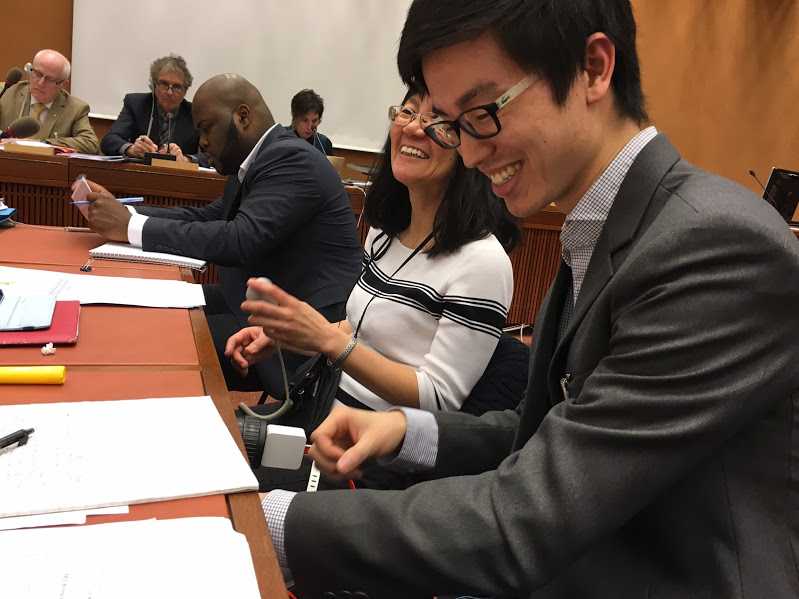Like this article? rabble is reader-supported journalism. Chip in to keep stories like these coming.
Has the new Trudeau Government ushered in a new era of Canadian respect for the international human rights system? According to the United Nations Committee on Economic, Social and Cultural Rights (CESCR), the answer is both yes and no.
In its recently released “Concluding Observations on Canada,” the UN Committee noted some positive steps taken over the past 10 years by Canada to improve its human rights record.
For instance, Canada’s ratification of the Convention on the Rights of Persons with Disabilities in 2010 and the new Government’s recent decision to restore the Interim Federal Health Program for certain categories of refugees and asylum seekers are all signs of improvement. Equally important was Canada’s decision to establish a national inquiry into the murders and disappearances of Indigenous women and girls.
But for members of racialized communities and immigrant groups in Canada, the Concluding Observations are of particular significance because for the first time, many of their long-held grievances are being heard by the UN and their calls for change reflected in the UN Committee’s final recommendations.
Several community groups representing these marginalized populations were on hand in Geneva to highlight growing colour-coded poverty rates and other race-related disparities experienced by Canada’s First Peoples and peoples of colour, as well as how these inequities are disproportionately shouldered by immigrants and migrants.
Thankfully, the communities’ efforts to bring international attention to these domestic challenges have not been in vain. In its Concluding Observations, the UN CESCR adopted a number of their key recommendations.
For example, the UN CESCR recommended Canada to step up its efforts to address unemployment faced by marginalized groups and to “strengthen the enforcement and monitoring of the Employment Equity Act” while expanding the Act’s coverage.
The committee further recommended Canada to “take measures to ensure the adoption of employment equity legislative and policy measures in all jurisdictions, in collaboration with provinces and territories.”
Currently, the federal Employment Equity Act only applies to roughly 12 per cent of the total Canadian workforce. The Canadian Government can play an important role in taking best practices from the federal experience and work with provinces and territorries to expand employment equity to the rest of the Canadian workforce — most of which are in provincially regulated sectors.
In terms of tackling poverty at large, the UN CESCR called on the Government of Canada, in collaboration with provinces, territories, to “implement a human-rights based national anti-poverty strategy, which includes measureable goals and timelines as well as independent monitoring mechanisms” and to “ensure that provinces and territories’ anti-poverty policies are human-rights based and aligned with the national Strategy.” The committee also expressed its concern that certain marginalized groups, including minority groups, “continue to experience higher rates of poverty” than the rest of the country.
On the issue of homelessness, the committee recommended Canada adopt a national strategy and to “collect data on the extent of homelessness disaggregated by geographic location, ethnicity, sex and social condition, and to combat homelessness.”
As welcome as this focus on the importance of disaggregated data is, there is no reason why it should be limited to the housing sector. All areas of government policy can be better informed if there is an intra-governmental directorate which collects and analyzes disaggregated data. In this vein, the federal government can look towards Ontario’s newly announced Anti-Racism Directorate as a model.
The UN Committee has also made several key recommendations specifically to address the issues facing African Canadians. It called on Canada to address issues faced by both Indigenous and African-Canadian children in accessing and completing primary and secondary school. It also urged Canada to take effective measures to address the over-representation of African Canadian children in child welfare systems. Finally, the committee recommended the use of the International Decade for People of African Descent as a vehicle to promote the human rights of this group.
Having the UN Committee raising these longstanding concerns and adopting constructive recommendations lend legitimacy to racialized communities’ call for action.
The new federal government has time and again affirmed that it takes its international obligations seriously. They can demonstrate their commitment by immediately adopting the committee’s recommendations and taking concrete action to implement them.
It is time for all levels of the government Canada to work with the civil society on developing an action plan to implement all of the recommendations made by the UN Committee. Only then will Canada truly achieve its desired standing on the world stage as a leader in international human rights.
Avvy Yao-Yao Go is the clinic director for the Metro Toronto Chinese & Southeast Asian Legal Clinic, a community-based organization that provides free legal services to low-income Chinese and Southeast Asian immigrant families in Toronto. MTCSALC is also part of the Colour of Poverty-Colour of Change Network.
Photo: Vincent Wong
Like this article? rabble is reader-supported journalism. Chip in to keep stories like these coming.



